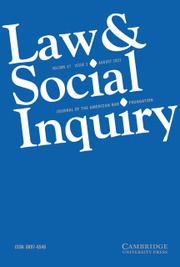From Law and Social Inquiry:
This article examples the challenges that the contemporary political economy of rental housing poses for new efforts to regulate tenant screening using antidiscrimination law. I draw on a case study of landlord practices in Seattle, Washington, where policy makers have been on the forefront of legal efforts to regulate how landlords screen and select rental applicants in the fact of an acute housing crisis. The case study investigates tenant screening and selection practices from the divergent perspectives of the targets and intended beneficiaries of new fair housing regulations, using forty-six in-depth interviews with spokespersons or experts from the rental housing industry, independent landlords and property managers, and rents with criminal, eviction, and/or damaged credit histories. I use these data to examine how landlords’ discretionary decision-making and responses to regulation are shaped by the broader legal, institutional, and economic context in which they operate. The findings illuminate how a “landlord’s market” amplifies the power imbalance that is characteristic of landlord-tenant relations, exacerbates the housing access problems poses by the proliferation of background checks, and frustrates new legal efforts to dismantle screening-related barriers to rental housing.

